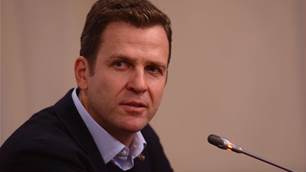The South African Police Service insist nothing will be left to chance in the fight to combat the ever-present threat of terrorism at next month's World Cup.
The year began with football in Africa hitting the headlines for all the wrong reasons as the Togo team's bus was attacked by gunmen en route to their African Nations Cup base in Angola, with three people killed in the assault.
The attacks immediately led to questions being asked about South Africa's readiness to host the world's biggest football tournament just a few months later and various South African officials, most notably World Cup organising committee chief executive Danny Jordaan, reacted angrily to people making the link.
It is something which also clearly irks Senior Superintendent Vishnu Naidoo, a spokesman for the South African Police Service, and he insists his force have put together a robust plan for combating the threat of similar terror attacks.
Naidoo told Press Association Sport: "It's the same as saying that if a bomb goes off in France during 2012 that people should start asking for the Olympics to be withdrawn from London. It's the same scenario, which is ridiculous.
"I really don't even dignify it with a response any more."
Togo's team bus came under fire in the enclave of Cabinda, with the Confederation of African Football criticising the Togolese for making what they claimed was an unauthorised journey by road.
Togo disputed that that had been the case, and Naidoo is adamant there will be no room for uncertainty in South Africa.
"The movement of teams is very, very important. We have a joint operational structure which is informed of movement of teams - no one will do their own thing at their own time," he said.
"We will be privy to information about where the teams are staying, where they will be travelling to and so forth. They will have close protection provided by us and all their movements will be known to us."
Naidoo added that SAPS have run simulations for various types of attack, including an assault with chemical, biological or radioactive weapons, hijackings, kidnappings and hostage situations.
"While South Africa is not a target for terrorism we couldn't remain complacent to that threat, we had to prepare ourselves for every eventuality," he said.
One other major issue the hosts have to deal with this is the threat of hooliganism, but again Naidoo is confident there will be no major disturbances.
"It is a long haul for people to come all the way to South Africa to make trouble. It is not like the tournament is taking place in a neighbouring country - Germany is not a hell of a distance away from London for example," he said.
"Number two is that it is very expensive to come here. You are not going to get people that are generally known to be organising fights or misbehaving as hooligans coming to South Africa. That actually makes us a bit confident."
Aside from the distance and cost issue, Naidoo warned that anyone still intent on causing trouble would be met with the full force of the South African authorities, with Interpol also assisting in keeping known 'Dangerous and Disruptive Persons' out of the country.
"We have sent out a clear message - we as South Africa want to host an event where all our visitors as well as our citizens thoroughly enjoy themselves, but in a responsible way," Naidoo said.
"We are not going to tolerate any individual or groups of persons making life difficult for those wanting to enjoy themselves. People will not know what to expect from police here, whereas they might in their neighbouring countries. I don't think they would like to take a chance here."
Any miscreants can expect swift justice, with 24-hour courts operating throughout the tournament.
"During the Confederations Cup (in 2009), two guys broke into the hotel room of two Brazilian police officers," Naidoo said.
"Within 24 hours they were tried and convicted and sentenced to five years' imprisonment each. It will be swift justice, whether they are found to be the perpetrators or in the unlikely event that they are victims (of a wrongful arrest)."
The attacks immediately led to questions being asked about South Africa's readiness to host the world's biggest football tournament just a few months later and various South African officials, most notably World Cup organising committee chief executive Danny Jordaan, reacted angrily to people making the link.
It is something which also clearly irks Senior Superintendent Vishnu Naidoo, a spokesman for the South African Police Service, and he insists his force have put together a robust plan for combating the threat of similar terror attacks.
Naidoo told Press Association Sport: "It's the same as saying that if a bomb goes off in France during 2012 that people should start asking for the Olympics to be withdrawn from London. It's the same scenario, which is ridiculous.
"I really don't even dignify it with a response any more."
Togo's team bus came under fire in the enclave of Cabinda, with the Confederation of African Football criticising the Togolese for making what they claimed was an unauthorised journey by road.
Togo disputed that that had been the case, and Naidoo is adamant there will be no room for uncertainty in South Africa.
"The movement of teams is very, very important. We have a joint operational structure which is informed of movement of teams - no one will do their own thing at their own time," he said.
"We will be privy to information about where the teams are staying, where they will be travelling to and so forth. They will have close protection provided by us and all their movements will be known to us."
Naidoo added that SAPS have run simulations for various types of attack, including an assault with chemical, biological or radioactive weapons, hijackings, kidnappings and hostage situations.
"While South Africa is not a target for terrorism we couldn't remain complacent to that threat, we had to prepare ourselves for every eventuality," he said.
One other major issue the hosts have to deal with this is the threat of hooliganism, but again Naidoo is confident there will be no major disturbances.
"It is a long haul for people to come all the way to South Africa to make trouble. It is not like the tournament is taking place in a neighbouring country - Germany is not a hell of a distance away from London for example," he said.
"Number two is that it is very expensive to come here. You are not going to get people that are generally known to be organising fights or misbehaving as hooligans coming to South Africa. That actually makes us a bit confident."
Aside from the distance and cost issue, Naidoo warned that anyone still intent on causing trouble would be met with the full force of the South African authorities, with Interpol also assisting in keeping known 'Dangerous and Disruptive Persons' out of the country.
"We have sent out a clear message - we as South Africa want to host an event where all our visitors as well as our citizens thoroughly enjoy themselves, but in a responsible way," Naidoo said.
"We are not going to tolerate any individual or groups of persons making life difficult for those wanting to enjoy themselves. People will not know what to expect from police here, whereas they might in their neighbouring countries. I don't think they would like to take a chance here."
Any miscreants can expect swift justice, with 24-hour courts operating throughout the tournament.
"During the Confederations Cup (in 2009), two guys broke into the hotel room of two Brazilian police officers," Naidoo said.
"Within 24 hours they were tried and convicted and sentenced to five years' imprisonment each. It will be swift justice, whether they are found to be the perpetrators or in the unlikely event that they are victims (of a wrongful arrest)."
Copyright (c) Press Association
Related Articles

Spain versus Italy to go ahead

Germany preparing for World Cup success













